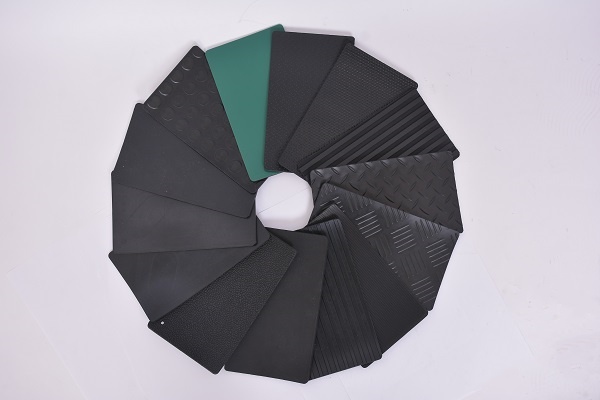
Anti-slip rubber mats play a crucial role in preventing slips and providing protection in various settings, including industrial environments, commercial spaces, and homes. To ensure their long-term performance and appearance, proper maintenance is essential. However, the maintenance cycle for anti-slip rubber mats is not a fixed answer but is influenced by several factors, such as the usage environment, frequency of use, and the quality and material of the rubber mats.
Generally, for daily cleaning, it is recommended to perform a simple sweep once a day or once a week. Use a soft-bristled brush or vacuum cleaner to gently clean the floor, which can effectively remove dust, debris, and minor stains, preventing them from accumulating and embedding into the rubber mat surface, which could affect the anti-slip performance and appearance.
Periodically, a more thorough cleaning may be necessary. The frequency of this depends on the level of contamination in the environment, typically ranging from once a week to once a month. If the rubber mat is in a relatively clean environment, such as a bedroom or a specific area in the living room, a deep clean once a month may be sufficient. However, in areas with more dirt and oil, like factory workshops or kitchen areas in restaurants, a deep clean may be required weekly. During deep cleaning, use a mild detergent and a damp cloth to gently wipe the surface of the rubber mat, but avoid using overly harsh chemicals that could damage the rubber material.

>send emails to sales@jingdongrubber.com,get a quote now
In addition to daily cleaning, it is also important to regularly inspect the condition of the anti-slip rubber mat.
It is recommended to conduct a comprehensive inspection every one to two months. Check for any cracks, damages, deformations, or fading. In industrial settings, where there is more weight and frequent friction from equipment, rubber mats are more prone to damage, so inspections may need to be more frequent. If any issues are found, take appropriate repair measures promptly. Minor damages can be locally repaired, but for large and severe damages, replacement may be necessary to ensure safety and normal use.
For the maintenance of the anti-slip treatment, depending on the usage conditions and the degree of performance decline, professional anti-slip treatment may be required every six months to a year.
Using a special anti-slip treatment agent for rubber floors can increase the friction coefficient of the surface and reduce the risk of slipping accidents. This is particularly important for rubber mats used in outdoor or damp environments.
When installing anti-slip rubber mats, there are also some precautions to take to extend their lifespan and reduce the hassle of subsequent maintenance.
For example, ensure the ground is flat, dry, and clean before installation. Avoid laying rubber mats directly on uneven or sharp surfaces to prevent damage. When joining rubber mats, use appropriate tools and methods to ensure a tight and seamless connection, preventing debris from entering the gaps and affecting the appearance and performance.
Jingdong Rubber Co., Ltd. is a professional rubber sheet manufacturer, producing silicone rubber sheet, natural rubber sheet, fluorine rubber sheet, neoprene rubber sheet, insulating rubber sheet,EPDM rubber sheets, oil-resistant rubber sheets, anti-static rubber sheets, flame-retardant rubber sheets, conductive rubber sheets, anti-slip rubber sheets, and cowshed mats, etc. with 40 years of industry experience, are popular both at home and abroad. If you need any of our products,please send emails to sales@jingdongrubber.com.

